Before I begin, a few disclaimers:
1) As a member of the online press core, I’ve never been invited to participate in a traveling press junket for a major Hollywood production.
2) While I understand their function within the film industry, the idea of press junkets makes me feel icky (which is why I don’t attend them even when I’m invited to one on my home turf of New York City).
3) Since my background is more “film nerd” than “fan boy,” I haven’t read very many set visit pieces in my life and therefore don’t know the industry standard way to write one.
4) Which is fine, because I have no intention of writing a typical set visit report here. Forgive my brazenness in believing that my personal connection to many of the involved parties warrants that I take a different approach.
5) This is not to say that I’m going to buck the system and disobey Universal Pictures by providing spoilers or anything like that.
6) This is also not to say that I have any interest in playing the industry standard game, whose main focus seems to be “boosting” invisible “traffic” and “building” a “pre-release buzz” (in this case, the movie itself isn’t being released for six months—how pre-release of a buzz do you people need?).
7) This is also not to say that I am coming from this angle to “scoop” the other junketeers with my “insider” status; they have as much to say as I do and I have a hunch they’ll say it much better than I (in fact, read the following reports before settling into mine just so you know how this should have been done: Devin Faraci of CHUD (though not anymore), Drew McWeeny of HitFix, Mike Sampson of JoBlo, Pete Stanton of AOL’s Moviefone, Orlando Parfitt of IGN, and Hunter Stephenson and Eric “Quint” Vespe’s coverage is on the way, I presume).
8) This story/article/dispatch/whatever might be long, but since it’s probably going to be the only high profile junket that I’m ever going to do, please indulge me.
9) If at any time this begins to sound like Michael Bamberger’s The Man Who Heard Voices, please shoot me in the head.
PART ONE: Historical Context
On the night of Sunday, October 4, 2009, I got on an airplane in New York City and flew to Belfast, Northern Ireland—on the dime of Universal Pictures—to participate in the online press junket for the $50,000,000 motion picture Your Highness, directed by indie auteur-turned-Hollywood player David Gordon Green.
Almost ten years to the month before that, in early July 1999, I got in my car and drove from New York City to Winston-Salem, North Carolina—on my own dime—to help work on the crew of the $40,000 independent film George Washington, directed by my buddy David Gordon Green.
As I write this now, in early October 2010, it is almost ten years to the day since that film, George Washington, screened at the prestigious New York Film Festival and opened theatrically just a few weeks later in New York City.
A lot can happen in ten years.
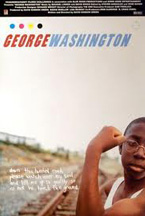 I remember the first time I saw the George Washington poster in public. It was hanging outside at Lincoln Plaza Cinemas near Columbus Circle, alongside other “real” movies that I can no longer recall (most likely the fall 2000 Woody Allen release, whichever the hell that one was). I stood on the curb and watched as people drifted past the image of Buddy (Curtis Cotton III) making a muscle and staring into the camera. I was determined to remain there until someone noticed it. Eventually, one girl did. She quietly stopped to take it in. I wondered what she was thinking. It was hard for me to wrap my brain around this seemingly innocent moment. David had rolled the dice and apparently it had paid off quite handsomely. Little did any of us realize just how handsome a gamble it would turn out to be.
I remember the first time I saw the George Washington poster in public. It was hanging outside at Lincoln Plaza Cinemas near Columbus Circle, alongside other “real” movies that I can no longer recall (most likely the fall 2000 Woody Allen release, whichever the hell that one was). I stood on the curb and watched as people drifted past the image of Buddy (Curtis Cotton III) making a muscle and staring into the camera. I was determined to remain there until someone noticed it. Eventually, one girl did. She quietly stopped to take it in. I wondered what she was thinking. It was hard for me to wrap my brain around this seemingly innocent moment. David had rolled the dice and apparently it had paid off quite handsomely. Little did any of us realize just how handsome a gamble it would turn out to be.
I don’t need to get into how I befriended the tight-knit crew that attended the North Carolina School of the Arts in the late-1990s, only that I didn’t, in fact, go there (this is by far my favorite case of mistaken education; seriously, the idea of David Green and David Berman and I strolling into the campus cafeteria on buffalo chicken wrap day is the parallel life I wish I had lived). But for the record, I did meet most of the late-’90s NYFF crew while they either had one year left in school or had just graduated.
In the summer of ‘98, Craig Zobel (writer/director of the criminally underseen and truly excellent Great World of Sound) and I shared a bedroom on the Lower East Side. Danny McBride was also living in NYC that summer (I remember him talking up an amazing script called Being John Malkovich on one occasion). At some point, David—who I’d heard about constantly but hadn’t yet met—flew into town to screen his student short Physical Pinball at The New School, where he took home an award if I recall correctly (note: I’m not even fact checking my own memory for this piece, so there you go—Internet journalism, suckas, that’s what’s up!). As with the other NCSA students that I’d met through Craig—especially Chris Gebert and Jane Rizzo—we connected right away. It made me wish I had gone to NCSA (sorry, UMBC).
David told me about a movie he was writing and was going to shoot on his own terms in North Carolina, outside of the industry. Working as an underling in Los Angeles had already proven to be a very wrong idea. For the next year, we emailed each other and I read drafts of this script, which he was calling George Washington. It was strange and nontraditional, and he was determined to shoot it on film. Though the digital revolution hadn’t completely overtaken the independent film world just yet, it was still a very bold decision for him to commit to celluloid.
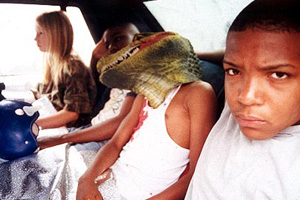 The following summer, David kept his word by rallying his former schoolmates in Winston-Salem for 17 days and shooting his debut feature on anamorphic 35mm (using lenses from Joe Dunton Camera, who also supplied the same lenses for a little ol’ movie called Blue Velvet). I kept my word as well, having assured him that I’d use my one-week vacation to drive to Winston and help out on the crew (for just about half of the shoot). My official credit, which I gave myself, is “costumes/make-up,” though in hindsight, “wardrobe/SFX make-up” was more accurate.
The following summer, David kept his word by rallying his former schoolmates in Winston-Salem for 17 days and shooting his debut feature on anamorphic 35mm (using lenses from Joe Dunton Camera, who also supplied the same lenses for a little ol’ movie called Blue Velvet). I kept my word as well, having assured him that I’d use my one-week vacation to drive to Winston and help out on the crew (for just about half of the shoot). My official credit, which I gave myself, is “costumes/make-up,” though in hindsight, “wardrobe/SFX make-up” was more accurate.
The experience was inspiring and great. It was hard work and it was hot, but everyone was excited to be making a full-fledged feature film. Many months later, back in NYC, I got to see the fruits of our labor in a small screening room in midtown. It was impossible to watch the film objectively—much like watching the first assembly of my very own film—but one thing I could assuredly say was that it had a unique voice and felt like a breath of fresh air in a way that I couldn’t quite articulate.
And then, George Washington was rejected from the Sundance Film Festival. At first, I remember a collective sense of disappointment, but its subsequent inclusion in the 50th Berlin International Film Festival’s Forum section restored everyone’s spirits. My day job kept me from joining the team in Germany—this was before any of us had been on the festival circuit so it felt like a very big deal—but I remember reading this first piece of press over and over and over again in my cubicle, sensing that something big was indeed happening. Was it ever.
The list of names in George Washington’s closing credits has proven to be an American Graffiti of sorts when it comes to churning out some of the best and brightest work in American cinema over the course of the past decade. If these names don’t ring a bell, they should:
David Gordon Green
Danny McBride
Paul Schneider
Tim Orr
Craig Zobel
David Wingo
Lisa Muskat
Richard A. Wright
Adam Stone
Eddie Rouse
Will Janowitz
Zene Baker
Steven Gonzales
Steve Pedulla
Chris Gebert
Mike Chapman
Andrew Gillis
Or, perhaps a better way of putting it is to list titles—David Gordon Green’s excluded, of course—in which the above names have played an influential role:
Bright Star
Eastbound & Down
Great World of Sound
Raising Victor Vargas
Shotgun Stories
The Foot Fist Way
The Assassination of Jesse James By The Coward Robert Ford
Chop Shop
Observe and Report
The Sopranos
Adventureland
The Guatemalan Handshake
Gentlemen Broncos
Man Push Cart
Homestar Runner (website)
Ola Podrida (music)
Thursday (music)
And that’s just off the top of my head.
After its world premiere in Berlin and subsequent victory lap over the course of the following year-and-a-half at festivals and in theaters (thanks to Cowboy Booking International), I assumed that David was the only one in our circle of friends who would achieve an even small measure of success. Call me ignorant, call me naïve. I just didn’t think that the world was big enough to lift up so many people from one small circle. Yet sitting on that airplane last October, ten years after driving to Winston-Salem, thinking of what the GW crew had managed to accomplish, I felt pretty damn proud.
PART TWO: Taste Buds Clarification
For anyone who knows David Gordon Green only through his films, Pineapple Express must have given them quite a shock. Well, if that movie was a shock, then Your Highness is going to be a full-blown electrocution. But if you watch Green’s student films, or if you’ve spent more than five minutes with him, the more pressing question is: Why didn’t this happen sooner?
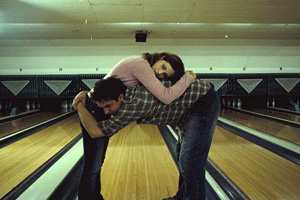 If one takes the time to consider Green’s pre-Pineapple output, there are of course the lyrical, poetic dramatics upon which his reputation was first based. Yet each of these films also contain moments of outright—dare I say straight-up silly—humor, something that I’ve always felt has been overlooked when discussing his oeuvre: in George Washington, Damascus (Rouse) delivering a heartfelt soliloquy about hating dogs because he got humped when he was a little boy; in All the Real Girls, pretty much everything Bust-Ass (McBride) says or does; in Undertow, Deel Munn (Josh Lucas) smoking a long, thin woman’s cigarette; even in the painfully somber Snow Angels, there is an overt nod to the absurd, as Glenn Marchand (Sam Rockwell) slow dances with a woman who is clearly very consciously dressed to look like Freddie Krueger. Granted, what tempers these scenes is that they’re played with 100% sincerity, giving viewers the space and time to process them on their own terms, as comedy or drama. This, in fact, is the trait that I deem to be the primary hallmark of David Gordon Green’s cinematic voice. Every single one of his films has the heart of a drama, no matter how comedic they happen to be. In this way, Your Highness fits into his catalog more seamlessly than one might initially think.
If one takes the time to consider Green’s pre-Pineapple output, there are of course the lyrical, poetic dramatics upon which his reputation was first based. Yet each of these films also contain moments of outright—dare I say straight-up silly—humor, something that I’ve always felt has been overlooked when discussing his oeuvre: in George Washington, Damascus (Rouse) delivering a heartfelt soliloquy about hating dogs because he got humped when he was a little boy; in All the Real Girls, pretty much everything Bust-Ass (McBride) says or does; in Undertow, Deel Munn (Josh Lucas) smoking a long, thin woman’s cigarette; even in the painfully somber Snow Angels, there is an overt nod to the absurd, as Glenn Marchand (Sam Rockwell) slow dances with a woman who is clearly very consciously dressed to look like Freddie Krueger. Granted, what tempers these scenes is that they’re played with 100% sincerity, giving viewers the space and time to process them on their own terms, as comedy or drama. This, in fact, is the trait that I deem to be the primary hallmark of David Gordon Green’s cinematic voice. Every single one of his films has the heart of a drama, no matter how comedic they happen to be. In this way, Your Highness fits into his catalog more seamlessly than one might initially think.
There’s another thing you should know. The early 20-something I met back in the late-‘90s, before all the Faulkner and Malick comparisons began to swirl, wanted to make huge movies within the studio system. Comedies, dramas, medieval action romps, it didn’t matter. David just lived and breathed movies like no one I had ever met before (or since) and he was determined to spend his life making them. To outsiders, a transition like the one that has taken place from George Washington to Your Highness might seem like an act of “selling out,” a bending to the system and a turning of one’s back on one’s “true inner artist.” In this case, that couldn’t be further from the truth. It’s quite the opposite, in fact. What has happened in only ten years with David Gordon Green is an example of personal victory, a symbol of one individual’s tireless enthusiasm and unwavering commitment to a nearly impossible mission: to continue making movies on one’s own terms without repeating oneself any step of the way. Do yourself a favor. Rent David Gordon Green’s first five movies and spend one weekend watching them back-to-back. The budgets, narratives, and genres may have changed, but the singular voice remains.
***Be sure to vote in this week’s poll on the main page to let us know which is your favorite David Gordon Green movie!***
***Stay Tuned For Tomorrow’s Post: Parts Three, Four, and Five (Set Visit Politics, Junket Day 1, and Junket Day 2)***
***If you haven’t already, read “YOUR HIGHNESS SET VISIT – AN INTRODUCTION” to see some more cool pics.***
— Michael Tully







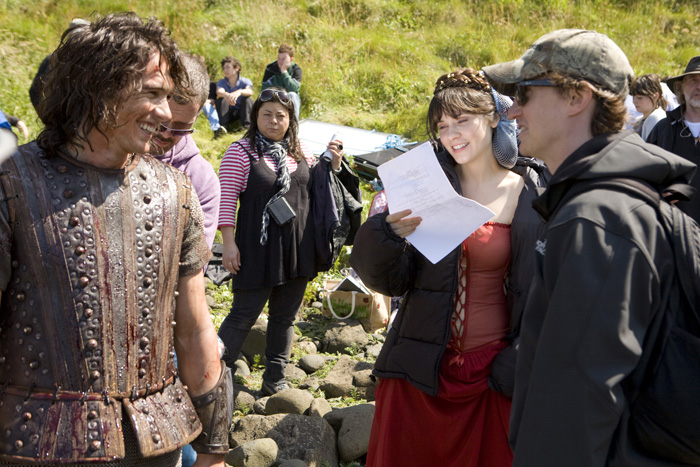

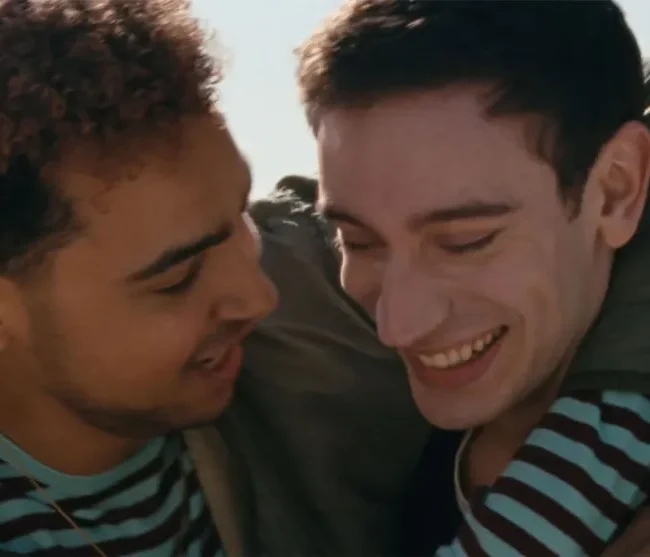
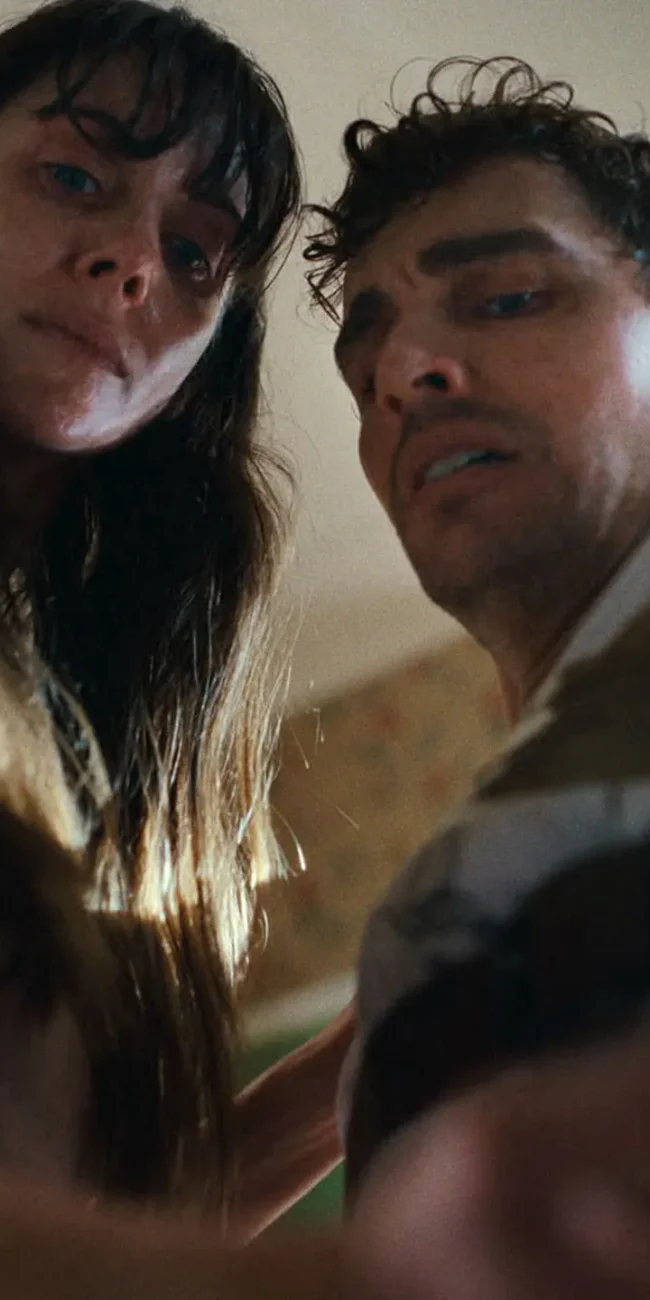


Brendan
Tully! I’m enjoying your ‘Your Highness’ Set Visit piece. It’s funny around the same time, the summer of 98 I was at NCSA for the summer session they have for high school students. When they ran out of things for us to do, which was often, they’d assemble all of us in one of the schools theaters and screen some of work from the recent years. Physical Pinball, This Morning, That Night, and Apple Pie Honest were among the the highlights. I remember being particularly excited about those. I remember walking around talking about them and quoting them with my friends that summer. And they weren’t just movies I liked, but movies that made me excited about making movies, I think they probably played a bit part in my deciding that not only would I apply to NCSA that fall for college, but that I wouldn’t even bother applying to another school.
Pingback: YOUR HIGHNESS – Hammer to Nail
Pingback: A Conversation With David Gordon Green (PRINCE AVALANCHE) – Hammer to Nail